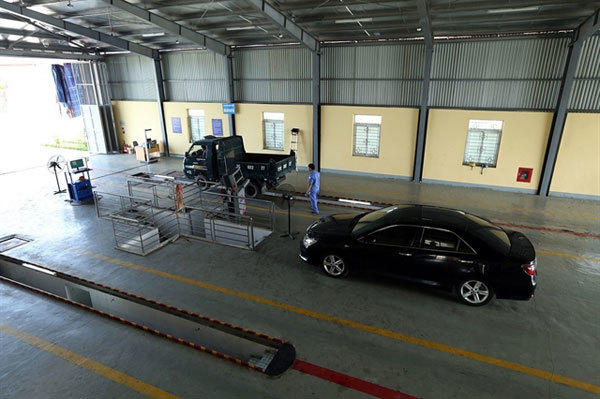 |
| A car registration centre in Dien Bien Province, Vietnam. — VNA/VNS Photo Phan Tuan Anh |
This has exposed several shortcomings in State management as well as unhealthy competition which needs solving soon, according to experts.
“Previously, the registration centres were State-owned entities. But since 2019, the new regulations allowed the private sector to participate, businesses began to massively invest into opening registration centres,” said Dang Viet Ha, vice director of the Vietnam Register (VR).
“Since then, the number of new registration centres has increased rapidly, especially private-invested ones,” Ha said.
According to the Government’s Decree 139/2018/NĐ-CP on providing vehicle registration services, organisations which meet conditions for facilities, testing and human resources as per the National Technical Regulation on registration issued by the Ministry of Transport are granted certificates of eligibility for vehicle registration service.
Thus, the establishment of registration units only stipulates the conditions of facilities, testing lines and human resources but does not limit the number of organisations participating and the number of registration centres opened, said Ha.
The VR’s statistics showed that in 2019 - the first year of implementing the new regulations – there were 32 new centres opened, which was equivalent to the number of centres opened in the 3-4 years combined before 2019.
And as of November this year, there were 232 registration centres nationwide.
In addition to the above number, there are currently over 40 businesses granted certificates and completing investment procedures.
Currently, Hanoi has the most registration centres with 27, followed by HCM City with 17, according to the VR.
According to traffic experts and the registration enterprises, Decree 139/2018/NĐ-CP has created favourable conditions and promoted the active development of the registration service in recent years.
In order to compete, the registration establishments have focused on investing in modern facilities and advanced technology, recruiting and training human resources to improve service quality.
As a result, the registration activity is competitive and the quality of service is dramatically improved.
Vu Van Tuan, a driver in Hanoi, said: "Since many private registration centres were opened, the registration service is no longer a monopoly of State-owned organisations.”
“Many centres proactively attract customers by texting or calling to remind them of registration deadlines. They also provided additional free services such as consultations for vehicle repair or car washes,” Tuan said.
Shortcomings
However, privatising the registration service has exposed shortcomings, according to experts.
In fact, there are poor-quality registration centres.
Regarding the economic perspective, allowing many registration centres to be established in the same area without taking into account the total number of vehicles means that many centres had no customers despite investing a lot of money, said Le Cao Cuong, a lawyer of An Vien Law Firm.
“This easily leads to unhealthy competition among centres, such as neglecting technical standards to retain customers to increase revenue and profit,” Cuong said.
“This was potentially dangerous for people and vehicles,” the lawyer said.
Nguyen Manh Thang, director of Registration Centre 2902V in Hanoi, said the number of customers coming to his centre have been declining because there were so many centres opened nearby.
“There is unfair competition. My centre’s signposts were frequently spray painted, even modified many times,” said Thang.
In April last year, the VR revoked the licence of the registration centre 98-03D in Bac Giang Province after detecting the centre’s registries were unqualified and the centre granted registration certificates for vehicles without testing.
In November this year, the VR carried out 64 inspections and suspended 26 registries, 19 of whom were of private centres.
Faced with the shortcomings that have arisen with the process of privatising the registration service, the VR has come up with urgent solutions to control the quality of vehicle testing and certificating at the registration centres.
The VR had enhanced online supervision via registration management software and surveillance cameras, and made unscheduled inspections in centres, said Dang Tran Khanh, vice head of VR’s vehicle registration section.
Besides, the VR was also promoting the application of digital technology and automation in motor vehicle registration and management of the registration centres, said Khanh.
The application of digital technology was expected to create a foundation to digitalise vehicle identification and increase automation in testing and testing supervision, avoiding fraud and improving the registration quality, Khanh said.
Meanwhile, Nguyen Van Thanh, former president of the Vietnam Automobile Transport Association affirmed that private involvement in the registration activity was the right policy.
However, in order for this policy to be effective as originally expected and overcome the shortcomings, it was required that the State management agencies were responsible and determined in inspection, examination and handling of violations, Thanh said.
“To make the registration service develop healthily under the market, the role of State management agencies was so important. If many wrongful registration stations are found, the — responsibility first and foremost lies at the highest state management agency in the registration,” Thanh added. VNS

HCM City suspends five driving facilities for using fake licences
HCM City Transport Department has revoked dozens of driving instructor certificates, as part of an inspection by transport authorities that also sanctioned five driving training establishments.

Transport ministry to inspect driving training, vehicle registration
The Ministry of Transport has asked relevant agencies to strengthen inspection of driving training centres and vehicle registration nationwide to improve traffic safety.